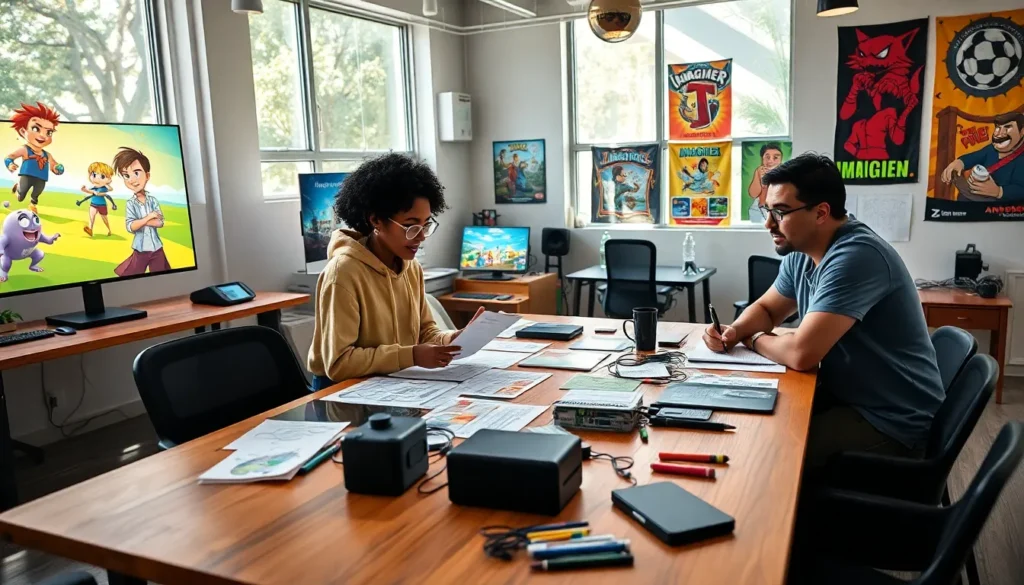Welcome to the coding clinic, where debugging your skills isn’t just a metaphor. Whether you’re a seasoned coder looking for a refresh or a newbie with dreams of building the next big app, this guide shines a light on essential coding skills. Prepare to embark on a hilarious yet informative journey through programming languages, learning tactics, and project-based practice, because let’s face it, coding isn’t just for the brainy types. It’s a world where creativity meets logic, and, at times, a sprinkle of chaos, just like that time your code ran flawlessly… until it didn’t. Let’s jump into the essentials of coding that will help them master their skills without losing their sanity.
Table of Contents
ToggleUnderstanding the Essentials of Coding

Coding is more than just writing lines of text: it’s about solving problems in a structured way. To kick things off, understanding the core concepts of coding is crucial. These include variables, control structures, data types, and syntax.
- Variables are like containers holding data. They can store anything from numbers to strings, and naming them properly can save future headaches. Imagine naming a variable ‘car’ and then trying to remember why you called it that when it actually holds the number of wheels.
- Control structures like loops and conditionals help dictate how a program flows. Learn to control the flow, and you’ll feel like an orchestra conductor directing a symphony, albeit one composed of ones and zeros.
- Next, understanding data types, such as integers, floats, and booleans, is key. Each has its unique purpose and limitation. A well-chosen data type can save memory and speed up processing. Who would have thought choosing between a string of text and a whole integer could feel so empowering?
- Finally, diving into the syntax of a language is essential. Each language has its quirks. One misplaced semicolon could send your entire script into chaos. Familiarizing oneself with the syntax means fewer headaches down the line and more time coding (or doing the cha-cha). Each of these elements lays the groundwork for becoming a proficient coder.
Choosing the Right Programming Language
Determining which programming language to learn first can feel like trying to choose a favorite child, nearly impossible. The landscape is vast, with each language serving a unique purpose.
- Python: Favored for its simplicity and readability, Python is perfect for beginners. It’s applicable in web development, data analysis, artificial intelligence, and more. If you’re looking for versatility, this is your go-to.
- JavaScript: For those eager to investigate into web development, JavaScript is where the magic happens. It allows dynamic interactions on web pages and is widely used alongside HTML and CSS. Anyone who has ever typed, “Hello, World.” into a console can tell you the joy that comes next.
- Java: A bit more complex but worth it, Java is great for building mobile applications and large systems. Its object-oriented approach can foster a deeper understanding of programming concepts.
- C++: If you want to understand how machines operate, look no further than C++. It’s powerful, but complexity increases. Learning it can feel like lifting weights for the brain, a bit heavy at first but incredibly rewarding.
- Ruby: Known for its elegant syntax, Ruby makes web application development seamless through frameworks like Rails. It brings a level of joy to coding that feels akin to writing poetry.
Choosing the right language can significantly impact the learning process. Start with one that aligns with your interests and career goals.
Structured Learning Approaches
When it comes to learning coding, structure can make all the difference. Whether through formal education or self-guided study, having a plan is essential for mastery.
- Bootcamps: Coding bootcamps have become a popular choice for many aspiring developers. They offer intensive courses that cover everything from fundamentals to advanced concepts in mere weeks, ideal for those looking to switch careers quickly.
- Online Courses: Platforms like Coursera, Udemy, and Codecademy provide an array of courses that can be consumed at your pace. With interactive exercises and real-life projects, these courses ensure that learning becomes a hands-on experience.
- Books: For those who prefer to go old-school, coding books can be invaluable. Titles like “The Pragmatic Programmer” or “Clean Code” not only teach but entertain with their engaging writing style. Turning pages can feel like unwrapping presents on Christmas morning, each chapter reveals new coding gifts.
- University Programs: For a more in-depth learning experience, consider enrolling in computer science courses at a university. This traditional route offers a comprehensive look at coding, algorithm design, and system architecture.
Combining different methods can enhance the learning experience, allowing flexibility in mastering coding skills.
Hands-On Practice: Importance of Projects
What’s a coding journey without some hands-on experience? Projects are where theoretical knowledge meets practical application. Completing projects can solidify the understanding of various concepts learned.
- Personal Projects: Start small with a personal project. It could be anything from creating a simple to-do list application to building a personal website. These projects not only reinforce concepts but also provide a portfolio to showcase.
- Open Source Contribution: Contributing to open-source projects is a fantastic way to gain experience and build professional connections. Platforms like GitHub are treasure troves filled with opportunities to collaborate with other developers.
- Hackathons: Participating in hackathons can be exhilarating. These events, often intense with time constraints, offer a chance to work on real-world problems and compete with other teams. Plus, they’re great for networking.
- Freelancing: For those looking to earn while they learn, freelancing on platforms like Upwork or Fiverr allows for the application of skills in diverse projects. Each completed task adds to the repository of real-world experience.
Projects breathe life into coding skills, transforming knowledge into tangible results.
Utilizing Online Resources and Communities
The internet is a goldmine of coding resources. Utilizing online platforms and communities can significantly aid the learning process.
- Forums and Communities: Platforms like Stack Overflow, Reddit, and GitHub provide spaces for developers to ask questions, share knowledge, and discuss topics. Engaging with these communities fosters a sense of belonging.
- YouTube Tutorials: Video tutorials are incredibly handy for visual learners. Channels dedicated to coding can simplify complex topics and show real-time coding. It’s like having a tutor in your pocket, available 24/7.
- Coding Challenges: Websites like HackerRank and LeetCode offer coding challenges that enhance problem-solving abilities. Tackling these challenges can be both fun and educational, turning coding into a competitive sport, without the sweaty uniforms.
- Blogs and Podcasts: Following influential bloggers and listening to coding podcasts can keep inspiration flowing. These platforms often discuss industry trends and best practices, making them invaluable resources for ongoing learning.
Incorporating online resources into a learning routine can enrich the coding experience and accelerate skill development.





